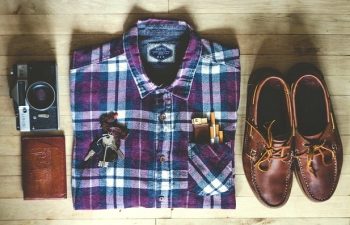5 Useful Chinese Verbs for Clothing and Accessories Posted by Ayana on Nov 4, 2019 in Vocabulary
A useful way to practice your Chinese is to talk about daily activities and objects. Like clothes and dressing. Here are 5 dressing verbs to use in your daily conversations.
穿 (chuān) means to wear, to put on a clothing. It is mainly used with clothes. 穿衣服 (chuān yī fú, means to wear clothes) is a useful daily verb + object. But, keep in mind, 穿 also can be used with hats, shoes, and jewelry. For example:
- 他穿着一件黄色的外套。
Tā chuān zhuó yī jiàn huáng sè de wài tào.
He is wearing a yellow coat.
- 学生们上课时不准穿牛仔裤。
Xué shēng men shàng kè shí bù zhǔn chuān niú zǎi kù.
Students are not allowed to wear jeans during class.
- 你穿的两只袜子不是一双。
Nǐ chuān de liǎng zhī wà zi bù shì yī shuāng.
The two socks you wear are not a pair.
- 她下床穿着拖鞋走过房间。
Tā xià chuáng chuān zhuó tuō xié zǒu guò fáng jiān.
She got out of bed and walked through the room with slippers.
戴 (dài) also means to wear, to put on, but it doesn’t refer to clothes. The verb 戴 is used with accessories, such as: glasses, hats, scarves, jewelry, wristwatch, trinkets, etc. For example:
- 你戴着那顶帽子真好看!
Nǐ dài zhe nà dǐng mào zi zhēn hǎo kàn!
The hat you are wearing is really beautiful!
- 服务员的耳朵上戴着一副长耳环。
Fú wù yuán de ěr duǒ shàng dài zhe yī fù cháng ěr huán.
The waitress is wearing a pair of long earrings.
- 我要是不戴眼镜,前面什么也看不清楚。
Wǒ yào shi bù dài yǎn jìng, qián miàn shén me yě kàn bù qīng chǔ.
If I don’t wear glasses, I can’t see anything.
- 他戴上假发把自己伪装起来。
Tā dài shàng jiǎ fǎ bǎ zì jǐ wèi zhuāng qǐ lái.
He put on a wig and disguised himself.
打扮 (dǎ ban) means to dress up. This verb doesn’t require an object. It refers to the whole outfit, or to the style of dress. Usually it will be followed by adjectives or particles denoting completion. For example:
- 你今天打扮这么好看!又去约会啊?
Nǐ jīn tiān dǎ bàn zhè me hǎo kàn! Yòu qù yuē huì a?
You dressed up so nice today! Are you going on a date?
- 她只用了一分钟就打扮好了。
Tā zhǐ yòng le yī fēn zhōng jiù dǎ bàn hǎo le.
It took her one minute to get dressed up.
- 他们都为赴晚会打扮得漂漂亮亮。
Tā men dōu wèi fù wǎn huì dǎ bàn dé piào piào liang liàng.
They all dressed up for the party.
- 他需要洗一洗,把自己打扮整洁。
Tā xū yào xǐ yī xǐ, bǎ zì jǐ dǎ bàn zhěng jié.
He needs to take a shower and dress up neatly.
换 (huàn) means to exchange, to replace. It is a general verb, used with different objects (money, books, car gear, etc.), and can also be used with clothes.
- 咱们得去,来不及换衣服。
Zán men dé qù, lái bu jí huàn yī fú.
We have to go, there is no time to change clothes.
- 请给我一分钟,宴会前我想换连衣裙。
Qǐng gěi wǒ yī fēn zhōng, yàn huì qián wǒ xiǎng huàn lián yī qún.
Please give me a minute, I want to change my dress before the party.
- 婚宴上一般新娘要换多少套礼服?
Hūn yàn shàng yī bān xīn niáng yào huàn duō shǎo tào lǐ fú?
How many sets of dresses does a bride usually change at her wedding party?
- 如果觉得穿燕尾服不方便,可以换成衬衫。
Rú guǒ jué dé chuān yàn wěi fú bù fāng biàn, kě yǐ huàn chéng chèn shān.
If you feel uncomfortable wearing a tuxedo, you can change to a shirt.
脱 (tuō) means to cast, to shed, to take off. It can refer to any object, including clothes and accessories. For example:
- 他们脱掉衣服跑进水里。
Tā men tuō diào yī fú pǎo jìn shuǐ lǐ.
They took off their clothes and ran into the water.
- 日本人到了家里就脱鞋。
Rì běn rén dào le jiā lǐ jiù tuō xié.
Japanese take off their shoes when they arrive home.
- 你如果出汗就把毛衫脱下来。
Nǐ rú guǒ chū hàn jiù bǎ máo shān tuō xià lái.
If you sweat just take off your sweater.
- 帽子脱下后,应该放在哪里呢?
Mào zi tuō xià hòu, yīng gāi fàng zài nǎlǐ ne?
Where should the hat be placed after taking it off?
好好学习,天天向上!

Build vocabulary, practice pronunciation, and more with Transparent Language Online. Available anytime, anywhere, on any device.





Leave a comment: